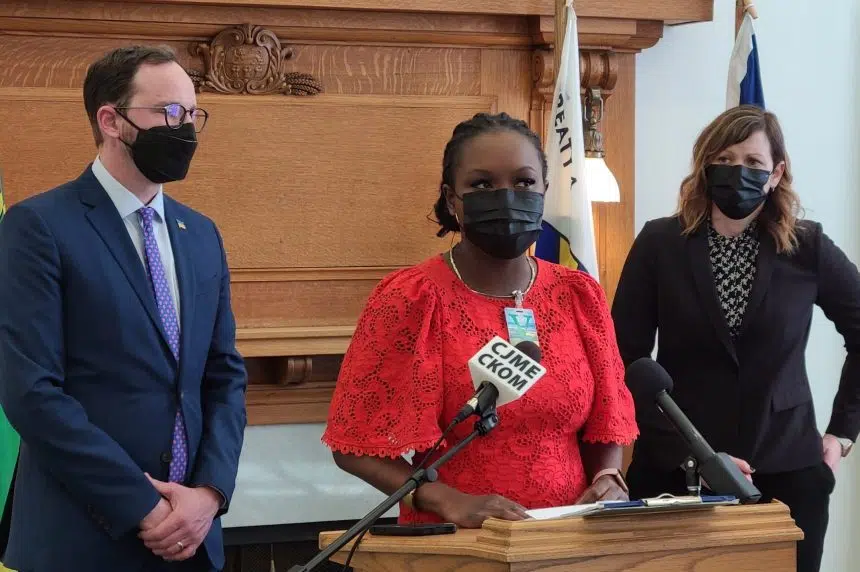Dr. Tomi Mitchell has run a medical clinic in Regina for more than a decade, but she’s shutting those doors.
“What I see right now is beyond tragic. I took an oath over a decade ago to do my best as a physician but we’ve been hampered by the lack of resources in the foundation of our health-care system and that is with primary care physicians who are in the community, who are doing their best to keep patients out of the emergency department,” Mitchell said Wednesday at the Saskatchewan Legislative Building.
She was joined by current NDP Leader Ryan Meili and the party’s health critic, Vicki Mowat.
Meili said there were 82 fewer family doctors practising in Saskatchewan since 2018, which included an 11 per cent drop in rural Saskatchewan.
“It is time that this government admitted the seriousness of the problem (and to) start working on an immediate response but also developing a health human resource plan to avoid the looming crisis of departures of nurses, care aides and physicians,” Meili said.
However, the Ministry of Health says its data shows the number of licensed physicians in Saskatchewan increased by 56 per cent between 2007 and 2021, with nearly 1,000 more doctors in that time.
The ministry said it counts licensed physicians, not just active ones.
Licensed physicians are ones who are licensed by the College of Physicians and Surgeons of Saskatchewan and are practising in Saskatchewan at the end of the year. Active physicians are licensed physicians with $60,000 or more in fee-for-service billings during the year and are practising in Saskatchewan at the end of the year.
The ministry also said there may be situations or instances of local vacancies or gaps. When those occur, the ministry works with the Saskatchewan Health Authority and www.saskdocs.ca to address short- and long-term needs.
Mitchell claimed the province hasn’t been providing help for her and others when it came to keeping clinics like her south Regina one open.
She was calling for more support when it came to leases, contracts for doctors to remain in the province, and help to even the playing field when it came to wages, saying staff leave clinics to work for the government and health authority because of how much better the pay is.
“We are not given the resources to keep the doors open,” Mitchell said. “While dollars are being spent in health care, it’s not being spent on what we claim is the backbone of our health-care system and that’s my concern.
“We have exposed our families to COVID. Many of our physicians are seniors with comorbidities and, in some cases, they were delivering babies when they weren’t eligible for vaccinations (or) dealing with COVID-positive patients. That’s a true story. That’s called betrayal. We’re expected to be there for our patients and we do it with pride, but give us support.”
She and Meili said these problems existed before the COVID-19 pandemic gripped the world.
“Those cracks were there and they’ve been revealed to a greater degree by COVID,” Meili said. “The level of burnout and frustration at a time when physicians were asked to do so much more has just gone through the roof.
“We’ve already seen that drop. I’m very concerned about what happens in the next two years as people start to back up and say, ‘OK, we’ve finished with this crisis. I can, in good conscience, walk away.’ The level of frustration (is high) from doctors who are looking at a government who doesn’t believe in science (and) doesn’t listen to them when they give them clear direction on how to keep people safe.”
Meili was also concerned about what the future held when it came to private health care in the province. Meili says wait times have only increased for MRIs since the province brought in a program that allowed people to get them done privately.
“(Government officials) are taking a crisis of their own creation — a crisis created by their decision to announce COVID over nearly a year ago, have the worst fourth wave in the entire country (and) put tens of thousands of people more on the waiting lists — (and) they are going to use that crisis they’ve created to try and destroy, through greater privatization, public health care,” Meili said.
“It’s down to the basic principle that if someone needs health care, they should be able to access that with their health card, not their credit card,” Mowat added.
As for Mitchell, she said while she will no longer run a clinic, she will continue to be an advocate for doctors in the province.
“I’m taking that time, that experience, that hurt and turning it into something positive. We can change. We can do better. I just have to use a different platform,” Mitchell said.







